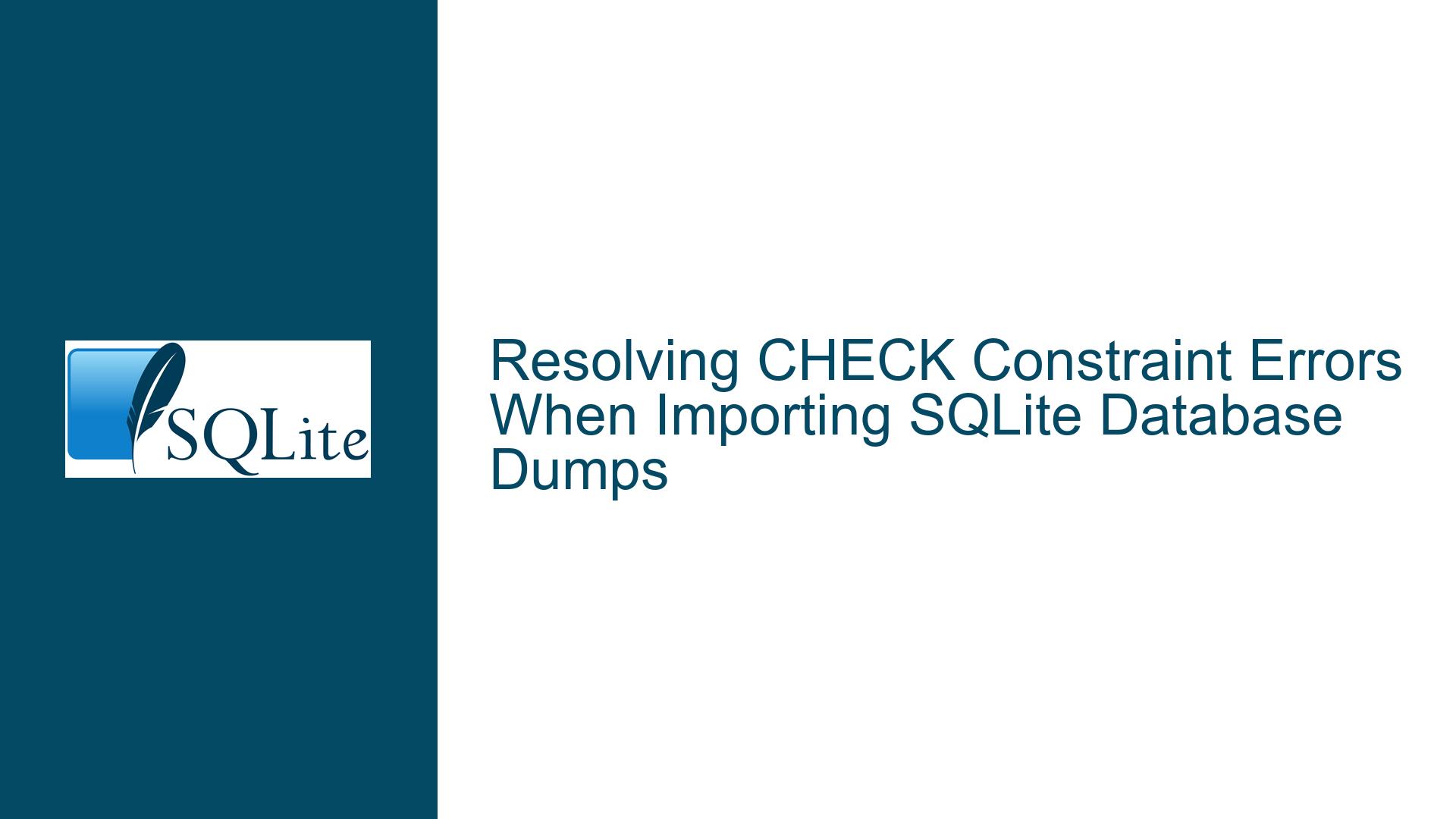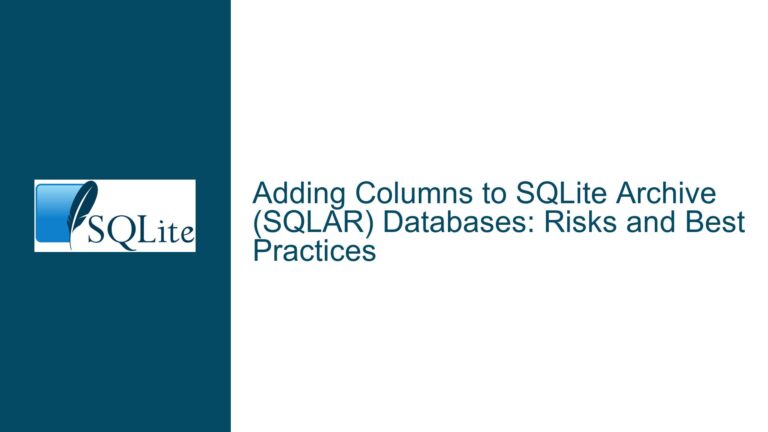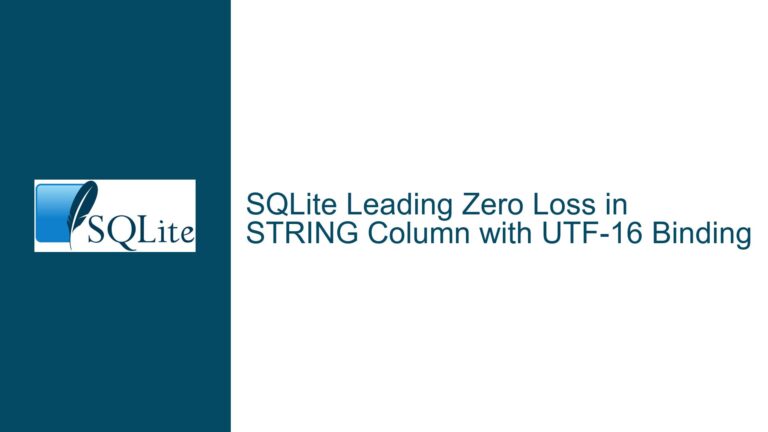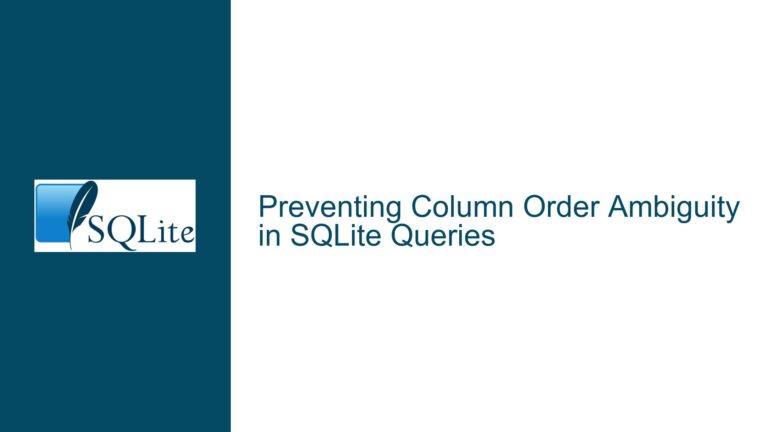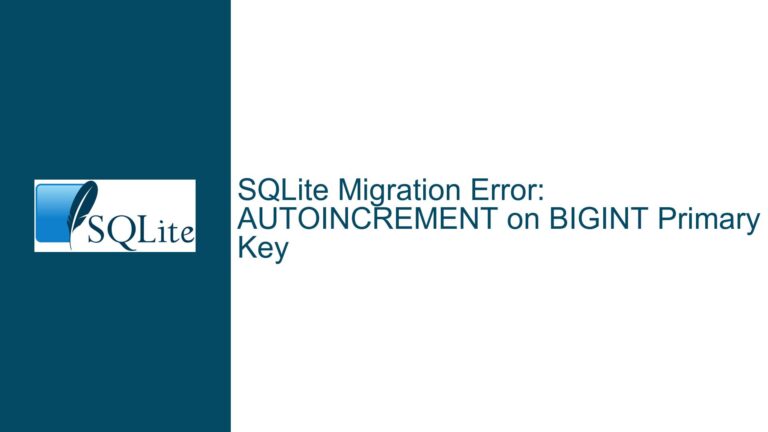Resolving CHECK Constraint Errors When Importing SQLite Database Dumps
Issue Overview: Invalid Column Reference in CHECK Constraints After Database Dump
The problem revolves around SQLite schema definitions for tables containing CHECK constraints that compare column types using typeof() with double-quoted string literals (e.g., "text"). When a database is dumped using the .dump command in the SQLite CLI tool and subsequently imported into a new database, the import fails with a parse error. The error message explicitly references a "no such column: text" failure at the location of the CHECK constraint. This occurs because SQLite versions 3.41.0 and later enforce stricter parsing rules for string literals and identifiers. Specifically, double-quoted values ("text") are interpreted as column identifiers rather than string literals, leading to a syntax error during schema import.
The root cause lies in how SQLite stores the original schema definition in the sqlite_master system table. If a CHECK constraint was originally defined with double quotes around the string literal "text" (e.g., typeof("uuid") = "text"), the .dump command faithfully reproduces this syntax. However, newer versions of the SQLite CLI tool (starting with 3.41.0) default to stricter parsing rules where double quotes are reserved for identifiers. This creates a mismatch between the dumped schema (with invalid string literals) and the parser’s expectations during import. The issue is exacerbated by the fact that older SQLite versions (pre-3.41.0) allowed double-quoted string literals in certain contexts, leading to schemas that are now invalid under stricter parsing rules.
Possible Causes: SQLite Version Changes and Schema Storage Mechanics
1. Stricter Parsing Rules in SQLite CLI (Post-3.41.0)
SQLite 3.41.0 introduced a change to the CLI tool’s default parsing behavior. Double-quoted values ("...") are now treated strictly as identifiers (e.g., column or table names), while single quotes ('...') are required for string literals. This aligns SQLite with standard SQL conventions. If a CHECK constraint uses typeof("column") = "text", the CLI now interprets "text" as a column name, which does not exist, causing a parse error.
2. Legacy Schema Definitions with Double-Quoted String Literals
Databases created before SQLite 3.41.0 might have CHECK constraints where string literals were written with double quotes. Older SQLite versions permitted this as a compatibility feature, treating double-quoted values as string literals if they could not be resolved as identifiers. However, the schema stored in sqlite_master retains the original double-quoted syntax, which becomes problematic when the .dump command reproduces it verbatim.
3. Implicit Schema Preservation During Dump
The .dump command generates SQL scripts based on the schema stored in sqlite_master. If the original schema used double-quoted string literals (due to legacy parsing leniency), the dumped script will contain the same invalid syntax. Importing this script into a newer SQLite version fails because the CLI no longer tolerates double-quoted string literals in CHECK constraints.
4. Version-Specific CLI Behavior
The error manifests differently depending on the SQLite CLI version:
- Versions <3.41.0: Import succeeds because double-quoted values are treated as string literals.
- Versions ≥3.41.0: Import fails unless compatibility modes (e.g.,
DQS_DDL) are enabled.
Troubleshooting Steps, Solutions & Fixes: Correcting Schema Definitions and Handling Dumps
Step 1: Diagnose the Schema Inconsistency
Inspect the Original Schema:
Querysqlite_masterto examine theCHECKconstraints:SELECT sql FROM sqlite_master WHERE type = 'table' AND name = 'alist_kv';Look for instances of
typeof("column") = "text".Validate Against Current SQLite Version:
Attempt to recreate the table manually in a new database using the dumped schema. If it fails, confirm that the issue is due to double-quoted string literals inCHECKconstraints.
Step 2: Short-Term Fixes for Importing Existing Dumps
Enable Legacy Parsing Modes:
Use the.dbconfigcommand in the SQLite CLI to enable double-quoted string literals during import:.dbconfig dqs_ddl on -- Allow double-quoted strings in Data Definition Language (DDL) .dbconfig dqs_dml on -- Allow double-quoted strings in Data Manipulation Language (DML)Then import the schema:
sqlite3 b.db < a.sqlThis bypasses the parse error without modifying the dump file.
Modify the Dump File:
Use a text-processing tool (e.g.,sed,perl) to replace"text"with'text'in theCHECKconstraints:sed -E 's/typeof\("([a-zA-Z_]+)"\) = "text"/typeof("\1") = '\''text'\''/g' a.sql > a_fixed.sql sqlite3 b.db < a_fixed.sqlThis ensures the imported schema uses valid string literals.
Step 3: Permanently Correct the Schema
Recreate the Table with Valid Syntax:
Create a new table with single-quoted string literals inCHECKconstraints and copy data from the old table:-- Create a temporary table with the corrected schema CREATE TABLE alist_kv_new ( uuid CHARACTER(36) NOT NULL PRIMARY KEY CHECK(typeof("uuid") = 'text' AND length("uuid") <= 36), list_type CHARACTER(3) CHECK(typeof("list_type") = 'text' AND length("list_type") <= 3), body TEXT, user_uuid CHARACTER(36) CHECK(typeof("user_uuid") = 'text' AND length("user_uuid") <= 36), created DATETIME NOT NULL DEFAULT (strftime('%Y-%m-%dT%H:%M:%SZ', 'now')) ); -- Copy data from the old table INSERT INTO alist_kv_new SELECT * FROM alist_kv; -- Drop the old table and rename the new one DROP TABLE alist_kv; ALTER TABLE alist_kv_new RENAME TO alist_kv;Directly Modify
sqlite_master(Advanced):
Use thewritable_schemapragma to update the schema definition directly:PRAGMA writable_schema = 1; UPDATE sqlite_master SET sql = REPLACE( sql, 'typeof("uuid") = "text"', 'typeof("uuid") = ''text''' ) WHERE name = 'alist_kv'; PRAGMA writable_schema = 0;Caution: Incorrect modifications to
sqlite_mastercan corrupt the database. Always back up the database first.
Step 4: Prevent Future Issues
Adopt Standard SQL String Literals:
Always use single quotes ('text') for string literals inCHECKconstraints, column defaults, and other schema definitions.Update SQLite CLI and Libraries:
Use SQLite 3.45 or newer, where the CLI automatically enablesDQS_DDLwhen importing a dump into an empty database. This mitigates the issue without manual intervention.Audit Existing Databases:
Proactively check for legacy schemas using double-quoted string literals and correct them before migrating to newer SQLite versions.
By addressing the schema definition inconsistencies, leveraging compatibility modes, and adopting standardized string literals, users can resolve parse errors during database imports and ensure compatibility with modern SQLite versions.
